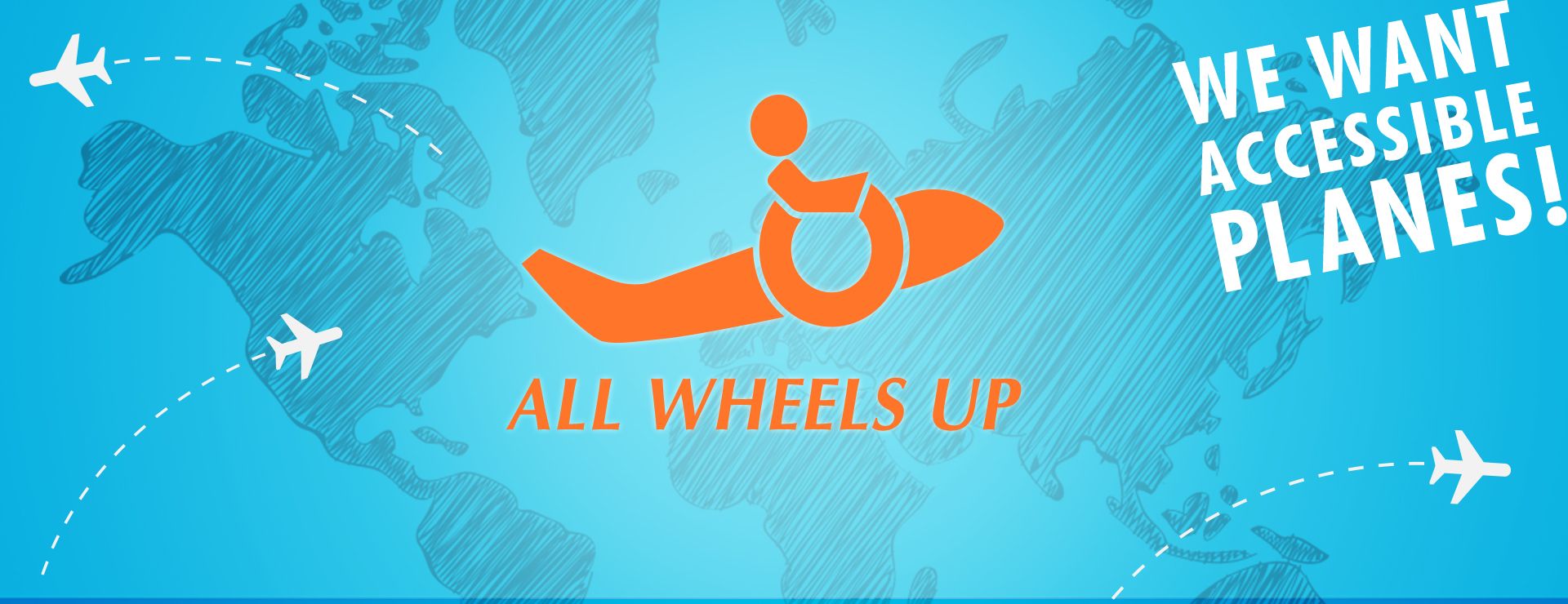New Bill for Airline Passengers with Disabilities, and Drafted with Support of All Wheels Up, Now Introduced to United States House and Senate
Contact: Michele Erwin
Phone: (917) 414-0897
FOR IMMEDIATE RELEASE
June 13, 2023
New Bill for Airline Passengers with Disabilities, and Drafted with Support of All Wheels Up, Now Introduced to United States House and Senate
The Mobility Aids On Board Improve Lives and Empower All (MOBILE) Act calls for formal tracking of damage to wheelchairs during flights and charge the U.S. Department of Transportation with investigating the physical and financial requirements needed to allow wheelchair users to fly on commercial airplanes while sitting in their wheelchairs.
FRISCO, TX – After working with United States legislators to craft a new bill, All Wheels Up (AWU), the first organization in the world to fund research and development for a “wheelchair spot” on commercial aircraft, is calling on Congress and the Senate to pass it. The MOBILE Act Act would institute multiple directives to airlines and the federal government in order to help people with disabilities fly more easily, chiefly tasking the Secretary of Transportation with studying the logistics and financial costs of allowing wheelchair users to fly seated in their wheelchairs and present a research plan to congress. The DOT would also have to keep track of damage to mobility devices organized by airline and report the information publicly. The bill was introduced to the House of Representatives in May and was co-authored by Congressmen Steve Cohen (D-TN) and Pete Stauber (R-MN) and Senators Tammy Duckworth (D-IL) and John Thune (R-SD). Congress and the Senate and will likely be rolled into the 2023 Federal Aviation Administration’s reauthorization which could be signed in the coming days.
Over 25 million Americans who say that they have a disability which limits traveling, according to a document from Senator Duckworth’s office, and in one month in the United States alone, there are roughly a thousand reports of damage to or mistreatment of wheelchairs during air travel.
“Airline travel in the United States and around the world continues to be extremely inequitable for people who use wheelchairs or have physical disabilities,” said Michele Erwin, the founder and president of AWU. “Everyone I know who uses a wheelchair or a mobility device and has ever flown, at least once, has landed and then discovered their device was damaged, missing, or couldn’t be brought to the plane door for deplaning. The MOBILE Act will better quantify damage done to mobility devices during air travel and loading as well as spur airlines, the government, and airplane manufacturers to fully strategize on how to best implement a ‘wheelchair spot’ in the main cabin of airplanes.”
Currently, the DOT releases the number of wheelchairs damaged every month by air travel but does not organize the data by prevalence per airline, type of damage sustained, and whether damage was to a manual chair, a power wheelchair, or a scooter. Additionally, airlines are not required to publish the cargo hold dimensions of airplanes for flights which can impede travelers with disabilities from being able to evaluate and make travel plans. The new regulation would require tracking of the above information and public posting of cargo-hold dimensions.
Erwin and other representatives of AWU met with Senators Duckworth and Thune and their offices over four days in February this year and requested the addition of the economic impact study that’s part of the bill. The AWU encourages those in the United States to contact their representatives in Washington and request that they support the bill.
While the MOBILE Act would call on further investigation into how to have wheelchair users and their wheelchairs in the main cabin of planes, proof-of-concept research funded by AWU in 2016 revealed that tie-downs from the wheelchair securement company Q’STRAINT could meet current FAA airplane seat standards. The researchers put wheelchairs and the locking system through a simulated crash test called the HYGE sled test, and securing both the wheelchairs and lock-down device proved feasible. In 2021, the Transportation Research Board within the National Academies of Sciences, Engineering, and Medicine, conducted its own research on the concept of securing wheelchair-users in their wheelchairs in planes and found “there appear to be, in this preliminary assessment, no formidable issues that present design and engineering challenges for installing in-cabin wheelchair securement systems in airplanes,” according to its report.
“All the testing done by engineers and scientists show there is no reason that wheelchair users cannot fly from the safety of their own wheelchairs, and the AWU is eager to continue to partner with manufacturers, airlines, innovators, and lawmakers to make it happen as soon as possible,” said Campanelli-Erwin. “The future will be full of true accessible air travel which includes a wheelchair spot on commercial airlines.”
###
About All Wheels Up
All Wheels Up (AWU) is the first not-for-profit organization in the world to fund research and development for a “wheelchair spot” on commercial aircraft. The not-for-profit organization is working with airline carriers and aircraft manufacturers to make airplanes wheelchair accessible for the millions of people who depend on them for mobility and safe seating. AWU’s mission is to increase awareness for safer and more dignified accessible air travel through research, advocacy, and community outreach.

